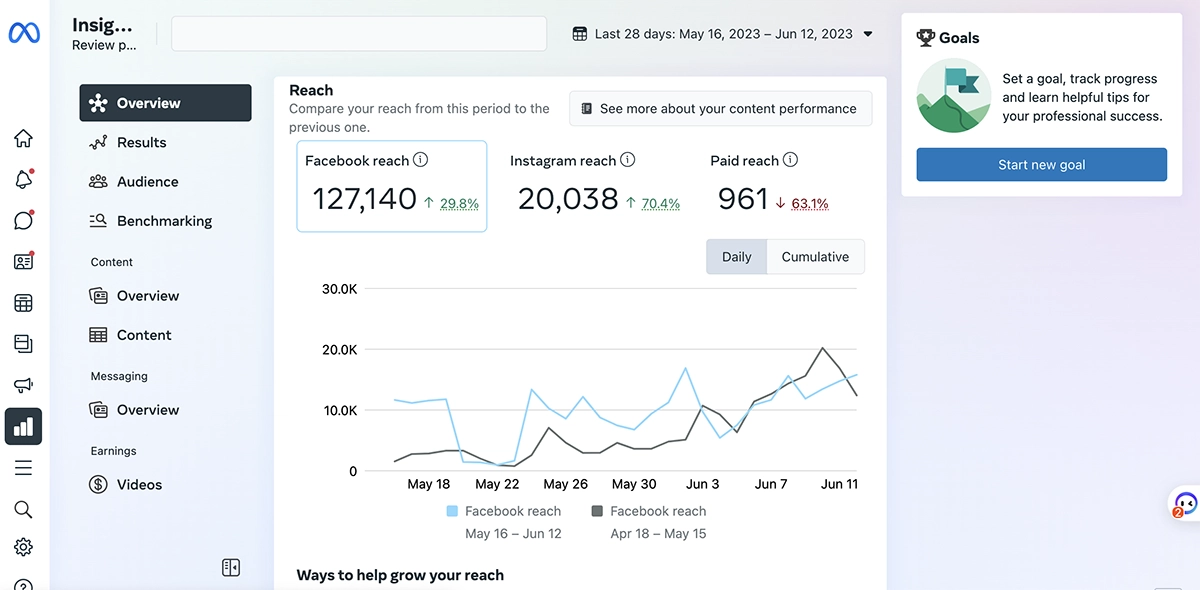Measuring the success of your marketing efforts is crucial; how will you know what is working and what is not without some quantifiable marker? Tracking results is important for any organization, but even more so for not-for-profits, which have high accountability for all dollars spent.
The tools you choose to measure your marketing efforts are as important as the tools you choose for day-to-day business operations. They all provide valuable metrics that will help you gauge the effectiveness of your strategies and enable you to make data-driven decisions—not emotional ones.
GA4 (The next-gen version of Google Analytics)
Google (GA4) is the predominant analytical tool. It measures website traffic and more, then tells you, in very specific detail, what type of traffic you’re getting to the website, where the traffic is coming from, what device someone is using, what country or region they’re from, and how long they are spending on a certain page. It can also track purchase path, meaning you can follow someone from the initial contact of receiving an email all the way through to them making a donation—and so much more. GA4 is free! Absolutely every organization should have an account.
Social Media Analytics
Every social platform (LinkedIn, Facebook, Instagram) has its own in-app analytics tools. They will give you critical analytics on engagement levels: how many people are viewing, commenting, liking, and sharing your content. You can see the number of followers and the most popular content. It can also give you some demographic understanding of your audience such as age range and geographic location. If you wish, you can use another third-party tool, get analytics through your CRM, or a third-party social scheduling app. But in truth, you can get almost everything you need from the in-app social dashboards.

Using Email Analytics to Track Engagement
Your email metrics will come from whatever third-party email platform you use (Mailchimp, Constant Contact, etc.) and may be integrated into your fundraising database or CRM system.
The email analytics can reveal who has opened the email, what they clicked on, and their level of engagement. There are tools in these platforms that allow you to test your email marketing efforts so you improve your open rate through better subject lines, send time, personalization, or preview text to name a few.
Conversion Tracking
Some platforms and tools will have their own way of tracking conversions. The metrics will follow the path of someone from the very first contact point to their conversion. The conversion is the endpoint when they:
- Make a donation
- Sign up for an event
- Subscribe to a newsletter
- Sign up to volunteer
Conversion tracking tools can help reveal problematic areas in a customer journey. Having this knowledge at hand will allow for improved marketing efforts and results.
Tracking Direct Mail for Marketing Success
Even in our digital age, direct mail is still a valuable part of fundraising, and tracking that activity is very important. Every response envelope with a gift that comes in should be coded to identify which campaign is generating better results. If your mailer has an online donation option, there should be built-in digital tracking through a QR code or unique URL created for tracking the efficacy of that specific campaign—and the specific segment of that campaign.

Measuring Success of Marketing Not-for-profits: Big Picture
There are all sorts of tools you can use to track activity, but how do you measure the actual success of your marketing efforts? A good place to begin is with industry benchmarks: the email platforms or advertising campaigns all provide data on what they deem to be a successful campaign threshold, so meeting or exceeding those benchmarks is a good start.
You need to look at all of the metrics to see what the actual success is.
Gaining thousands of followers on social media is nice, but if that doesn’t lead to donations, then your marketing strategies are not effective.
All of your marketing efforts should be aligned and serve your fundraising and operational goals. The metrics are the most useful when you can examine them and determine where and how the success came about.
What are Your Marketing Key Performance Indicators?
All marketing initiatives need key performance indicators (KPIs). The tools you use will help you assess and adjust your efforts to improve your KPIs. They vary for each organization and specific marketing plan, but some examples of important KPIs for not-for-profits are:
- Total amount of funds raised in a year
- How many new donors acquired in a year
- Your donor retention rate
- Average gift size
Ultimately, you want to be more successful than your last campaign.
What Tools Would be Most Effective for Your Organization?
At Trillion, we work with many not-for-profits on their marketing initiatives and understand the importance of tracking and measuring marketing success. We have helped many of our clients improve and exceed their fundraising goals. If you’d like help understanding and utilizing your analytics, give us a call at 908.219.4703 or complete our contact form.







